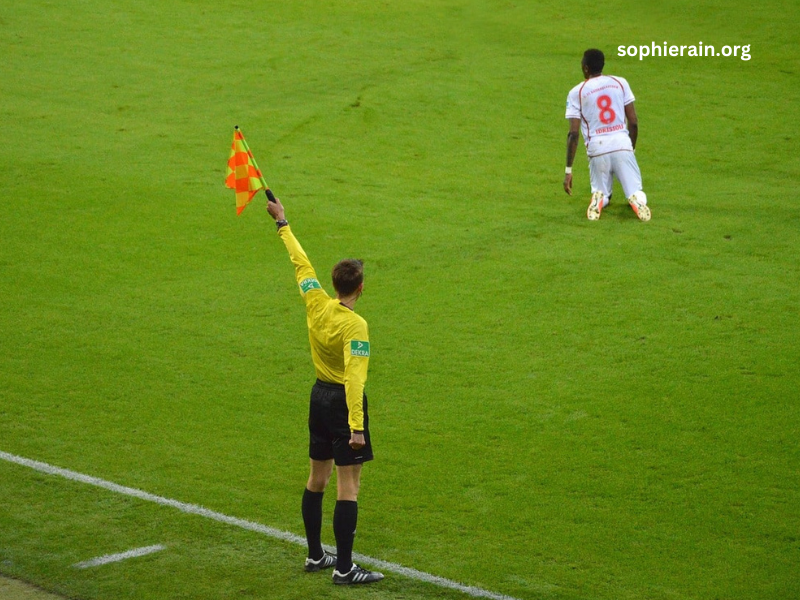In the dynamic world of team sports, the roles of game officials are crucial to maintaining fairness, safety, and the integrity of the game. Game officials, commonly known as referees or umpires, are responsible for enforcing the rules and regulations of the sport, making quick decisions, and ensuring a level playing field for all participants. This article will delve into the major roles of game officials in team sports, exploring their responsibilities, the skills required for their position, and the impact they have on the overall sporting experience.
Rule Enforcement
One of the primary responsibilities of game officials is to enforce the rules of the sport. This includes understanding the intricacies of the game’s regulations and ensuring that all players adhere to them during play. Game officials are tasked with making judgment calls on fouls, penalties, and infractions, which requires a deep knowledge of the rules.
For instance, in sports like basketball, referees must be vigilant about violations such as traveling, double dribbling, and personal fouls. In football (soccer), officials must be aware of offside rules and conduct fouls. Consistent enforcement of the rules helps maintain the integrity of the game and provides a fair competitive environment for all teams.
Game Management
Game officials play a pivotal role in managing the flow of the game. This involves making quick decisions to keep the game moving smoothly and efficiently. Referees must be adept at handling various situations, such as managing player disputes, controlling the tempo of the game, and ensuring that timekeeping is accurate.
During a match, officials often face intense pressure from players, coaches, and spectators. Their ability to remain calm and composed in high-stress situations is vital for effective game management. By maintaining control over the game, officials help create a positive atmosphere that allows players to focus on their performance.
Safety and Fairness
Ensuring the safety of all participants is a critical role of game officials. They must be vigilant about player safety, identifying dangerous plays or aggressive behavior that could result in injury. By enforcing rules that promote safe play, officials help protect athletes and reduce the risk of injuries.
Fairness is also a core aspect of an official’s duties. Game officials are responsible for treating all players equally and making impartial decisions. This impartiality fosters trust among players and coaches, which is essential for the credibility of the sport. An official’s commitment to fairness contributes to a positive sporting environment, where athletes can compete without fear of bias or favoritism.
Communication Skills
Effective communication is a fundamental skill for game officials. They must be able to convey decisions clearly and confidently to players, coaches, and fans. This includes explaining calls, issuing warnings, and providing feedback to players. Strong communication skills also extend to non-verbal cues, such as gestures and signals, which are essential in conveying decisions in a fast-paced game.
Additionally, game officials often need to engage with coaches and team captains to discuss rules and clarify decisions. Establishing clear lines of communication can help prevent misunderstandings and conflicts during the game. By fostering open dialogue, officials can enhance the overall sporting experience for everyone involved.
Decision Making
Game officials are often required to make split-second decisions during a match. These decisions can have significant consequences on the game’s outcome, making the ability to think critically and act decisively paramount. Referees must assess situations quickly, evaluate player actions, and determine the appropriate course of action based on their understanding of the rules.
The pressure of making the right call in high-stakes moments can be intense. Therefore, officials must be well-trained to handle such scenarios and remain confident in their judgments. This decision-making ability is crucial for maintaining the integrity of the game and ensuring that all players are held accountable for their actions.
Conflict Resolution
Conflict resolution is another essential role of game officials. Disagreements often arise during a match between players, coaches, and even spectators. Officials are tasked with de-escalating conflicts and ensuring that they do not disrupt the game. This may involve issuing warnings, penalizing players, or, in some cases, ejecting individuals from the game.
Effective conflict resolution requires diplomacy and strong interpersonal skills. Officials must navigate tense situations and make decisions that uphold the rules while maintaining the respect of all parties involved. By handling conflicts appropriately, officials contribute to a more positive and respectful sporting environment.
Technical Knowledge
To be effective, game officials must possess a thorough understanding of the sport’s technical aspects. This includes knowledge of game mechanics, strategies, and player roles. Officials must also stay updated on rule changes and modifications to ensure they are enforcing the most current regulations.
In addition, officials often undergo training and certification processes to enhance their technical knowledge and officiating skills. Continuous education helps them refine their abilities and remain competent in their roles. By possessing a solid foundation of technical knowledge, officials can make informed decisions that positively impact the game.
Role Models
Game officials serve as role models for athletes and fans alike. Their behavior on and off the field can influence the culture of the sport. By exhibiting professionalism, respect, and sportsmanship, officials set a standard for players to follow. Their conduct can inspire athletes to embody similar values, fostering a culture of respect and integrity within the sport.
Moreover, officials often engage with the community through outreach programs, clinics, and workshops. These initiatives help promote the sport and emphasize the importance of fair play and good sportsmanship. By serving as positive role models, officials contribute to the overall development of athletes and the sport as a whole.
Collaboration with Other Officials
In many team sports, officiating is a collaborative effort. Game officials often work in teams, particularly in sports like basketball and football, where multiple referees are present during a match. Effective collaboration among officials is essential for ensuring that all aspects of the game are covered and that decisions are made collectively.
Teamwork among officials involves clear communication, shared responsibilities, and mutual respect. By working together, officials can support each other in making accurate calls and managing the game effectively. This collaborative approach enhances the overall quality of officiating and contributes to a fairer game.
Emotional Intelligence
Emotional intelligence is an often-overlooked quality that is vital for game officials. They must be attuned to the emotions of players, coaches, and fans, understanding when tensions may rise and how to address them effectively. This skill allows officials to manage the emotional climate of the game and respond appropriately to various situations.
For instance, recognizing when a player is frustrated or when a coach is upset can help officials navigate potentially volatile situations. By demonstrating empathy and understanding, officials can defuse tensions and maintain a positive atmosphere during the game. Emotional intelligence enhances an official’s ability to connect with players and coaches, fostering a respectful and cooperative environment.
Post-Game Responsibilities
Game officials have responsibilities that extend beyond the playing field. After the game, they may need to compile reports detailing the match’s incidents, including any penalties issued or conflicts resolved. These reports can be crucial for league administration and future officiating assignments.
Additionally, officials may participate in post-game discussions with coaches and players to review their performance. This feedback loop is vital for continuous improvement and helps officials refine their skills. By engaging in these post-game responsibilities, officials contribute to the overall growth and development of the sport.
Adaptability
The ability to adapt to various situations is another essential quality for game officials. Each game can present unique challenges, whether it’s varying weather conditions, differing player behaviors, or unexpected incidents. Officials must be flexible and adjust their officiating style accordingly.
Adaptability also extends to technological advancements in officiating. Many sports now utilize video replay systems to assist in decision-making. Officials must be prepared to integrate these technologies into their officiating processes while maintaining their primary responsibilities on the field.
Conclusion
The roles of game officials in team sports are multifaceted and vital for ensuring the integrity, safety, and enjoyment of the game. From enforcing rules and managing the game to resolving conflicts and serving as role models, officials play a significant role in shaping the sporting experience for athletes, coaches, and fans alike. Their commitment to fairness, effective communication, and professionalism contributes to a positive sporting culture that enhances the overall quality of team sports.
As we continue to recognize the importance of game officials, it is essential to support their development and appreciate the critical functions they serve in the world of sports. The dedication and expertise of game officials are instrumental in promoting a fair and enjoyable environment for athletes, ensuring that team sports thrive for generations to come.






